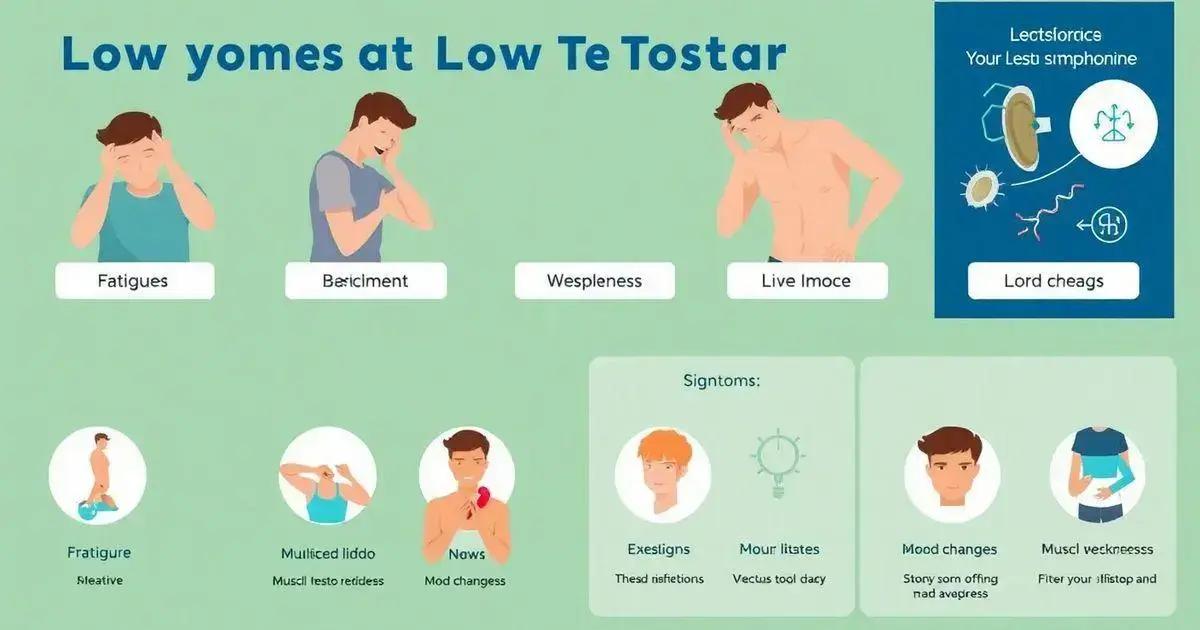The link between testosterone levels and overall health is crucial for men, as low testosterone can lead to fatigue, reduced libido, mood changes, and muscle weakness. Boosting testosterone naturally through exercise, a healthy diet, quality sleep, and stress management can significantly improve well-being.
Testosterone plays a crucial role in overall health and well-being for men. Low testosterone levels can significantly affect physical performance, mood, and essential bodily functions. Understanding the link between testosterone and overall health is vital for recognizing symptoms and improving quality of life. This article delves into testosterone’s impact, signs of deficiency, and natural ways to enhance levels for better health.
Understanding Testosterone: An Overview

Testosterone is a hormone primarily produced in the testicles for men, and in smaller amounts in the ovaries for women. It is crucial for various bodily functions, including development of male characteristics, muscle mass, and bone density.
The normal range of testosterone levels varies but is typically between 300 to 1,000 ng/dL in men. Women usually have lower levels, around 15 to 70 ng/dL. These levels can change based on many factors, such as age, health, and lifestyle.
Role of Testosterone
Testosterone is vital for maintaining strength, energy, and mood. It helps in the formation of red blood cells and contributes to sexual and reproductive functioning. Moreover, it assists in the maintenance of muscle and bone health, helping keep the body strong as it ages.
Factors Affecting Testosterone Levels
Several factors can influence testosterone levels, including age, diet, exercise, and stress. As men age, testosterone levels naturally decline, with levels typically decreasing about 1% per year after the age of 30. Unhealthy lifestyle choices, such as obesity and sedentary behavior, can contribute to lower testosterone production.
Importance for Overall Health
The link between testosterone levels and overall health spans beyond just physical aspects. Adequate testosterone levels can positively impact mood, cognitive function, and sexual health. Low testosterone can lead to symptoms like fatigue, depression, and reduced libido, all of which can affect quality of life.
How Testosterone Affects Men’s Health

Testosterone significantly impacts men’s health in various critical ways. It is not only the hormone responsible for male physical traits but also plays a vital role in overall well-being.
Physical Health
Muscle mass and strength are heavily influenced by testosterone levels. This hormone aids in muscle growth and retention. Adequate testosterone contributes to maintaining a healthy body composition, which is essential as men age. A decline in testosterone can lead to increased body fat and a decrease in muscle strength.
Mood and Mental Health
Testosterone levels can also affect mood and mental well-being. Low testosterone is often linked to feelings of depression, fatigue, and irritability. Studies have indicated that maintaining balanced testosterone levels can help improve mood and increase energy levels, leading to a more positive outlook on life.
Sexual Health
Testosterone is critical for sexual health. It plays a significant role in libido (sex drive) and erectile function. Men with low testosterone may experience a reduction in sexual desire and performance issues, which can affect relationships and overall happiness.
Bone Density
The hormone is essential for maintaining bone health and density. Low testosterone levels can lead to brittle bones and an increased risk of fractures and osteoporosis. Ensuring adequate levels of testosterone can support bone strength throughout a man’s life.
Therefore, understanding how testosterone affects men’s health is crucial for recognizing potential issues and taking proactive steps toward wellness.
Signs of Low Testosterone Levels

Recognizing the signs of low testosterone levels is important for maintaining overall health. Men experiencing low testosterone may notice several physical and emotional symptoms.
Fatigue and Low Energy
A significant drop in energy levels is a common sign. Men may feel more tired than usual and lack the energy to engage in daily activities, even after a good night’s sleep.
Reduced Libido
A noticeable decrease in sexual desire can occur with low testosterone. Men may find they have less interest in sex or fewer spontaneous erections.
Muscle Weakness
Low testosterone can lead to muscle weakness and a decrease in muscle mass. Activities that once felt manageable may become more challenging.
Weight Gain
Another sign includes unexplained weight gain, especially around the abdomen. Hormonal changes can impact fat distribution and metabolism.
Mood Changes
Men may also experience mood swings, irritability, or even symptoms of depression. These emotional changes can affect relationships and quality of life.
Difficulty Concentrating
Difficulty with focus, memory issues, and dull cognitive functions are also linked to low testosterone levels. This can impact work performance and daily routines.
If you or someone you know is experiencing these symptoms, it’s vital to consult with a healthcare provider for proper evaluation and guidance on testosterone levels.
Boosting Testosterone Naturally for Better Health

Boosting testosterone levels naturally can lead to better health and improved well-being. Here are several effective strategies to consider.
Regular Exercise
Engaging in regular physical activity is one of the best ways to enhance testosterone levels. Strength training, such as weightlifting, has been shown to significantly boost testosterone. Even moderate exercises like walking can help.
Healthy Diet
Nutrition plays a vital role in hormone health. A diet rich in healthy fats (like avocados and nuts), lean proteins, and lots of fruits and vegetables can support testosterone production. Avoiding processed foods and sugars is also essential.
Quality Sleep
Getting enough quality sleep is crucial for maintaining testosterone levels. Aim for 7 to 9 hours of sleep each night. Poor sleep can lead to hormonal imbalances and decreased testosterone.
Stress Management
High stress levels can elevate cortisol, a hormone that negatively impacts testosterone. Practicing relaxation techniques like meditation, yoga, deep breathing, or hobbies can help lower stress levels.
Vitamin and Mineral Intake
Ensure adequate intake of vitamins and minerals, particularly vitamin D and zinc. These nutrients are important for testosterone production. Sunlight exposure or supplements can help maintain healthy levels.
Limit Alcohol and Avoid Drugs
Reducing alcohol consumption and avoiding illicit drugs can improve overall hormone health. Excessive alcohol and drug use can lower testosterone levels and impact various bodily functions.
Implementing these strategies can help men naturally boost testosterone levels and support overall health.
Summarizing the Importance of Testosterone for Health
Understanding the link between testosterone levels and overall health is essential for both men and women. Hormones play a significant role in physical, mental, and emotional well-being.
Recognizing the signs of low testosterone can help individuals take proactive steps toward improving their health. Whether through lifestyle changes, exercise, or dietary adjustments, boosting testosterone naturally is achievable.
By prioritizing activities that support healthy testosterone levels, such as engaging in regular exercise, managing stress, ensuring nutritious diets, and maintaining quality sleep, individuals can enhance their quality of life and overall health.
Ultimately, by staying informed and acting on these insights, everyone can work towards better health and wellness.
FAQ – Frequently Asked Questions about Testosterone and Health
What are the common signs of low testosterone levels?
Common signs include fatigue, reduced libido, muscle weakness, weight gain, mood changes, and difficulty concentrating.
How can testosterone affect a man’s overall health?
Testosterone plays a crucial role in physical strength, mental health, sexual health, and bone density.
What are natural ways to boost testosterone levels?
Natural ways include regular exercise, healthy diet, quality sleep, stress management, and adequate vitamin and mineral intake.
Can low testosterone levels impact mood?
Yes, low testosterone can lead to mood swings, irritability, and even symptoms of depression.
Is it possible to maintain healthy testosterone levels with age?
Yes, with a healthy lifestyle that includes proper nutrition, exercise, and stress management, men can maintain optimal testosterone levels as they age.
When should I see a doctor about testosterone levels?
You should see a healthcare provider if you experience symptoms of low testosterone or have concerns about your hormone levels.













